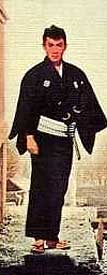 "Once I draw, you're all dead men," warns Kyoshiro Nemuri the Full Moon Swordsman, in the first scene of The Adventures of Kyoshiro Nemuri: The Chinese Jade (1963). It's the first of many films about a Eurasian ronin played by Raizo Ichikawa, a gigantic film idol of his day, but whose career was cut short by cancer at the age of thirty-seven. Of his many memorable roles, that of Kyoshiro the Son of the Black Mass has remained best known. "Once I draw, you're all dead men," warns Kyoshiro Nemuri the Full Moon Swordsman, in the first scene of The Adventures of Kyoshiro Nemuri: The Chinese Jade (1963). It's the first of many films about a Eurasian ronin played by Raizo Ichikawa, a gigantic film idol of his day, but whose career was cut short by cancer at the age of thirty-seven. Of his many memorable roles, that of Kyoshiro the Son of the Black Mass has remained best known.
"Without some new excitement every day, I begin to feel like I'm dead," Kyoshiro confesses. Often his reason for doing something, whether cruel or chivalrous, is only because he was bored, not because he'd made some decision about right or wrong. He says, "I am a rogue who cuts up men like radishes."
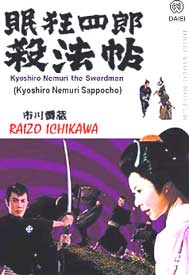 Though we as film goers may admire Raizo's performance in this unusual & morally ambiguous role, our initial opinion is apt to be wrong, that this character is ninety-percent heroic & when he "cuts up men like radishes" they deserve it. Though we as film goers may admire Raizo's performance in this unusual & morally ambiguous role, our initial opinion is apt to be wrong, that this character is ninety-percent heroic & when he "cuts up men like radishes" they deserve it.
As we get to know him, especially as the series progresses, the percentage of his personality that is heroic will assuredly diminish. It wouldn't be surprising if some viewers found him too appalling to appreciate.
He hates pride more than he hates sin, & he has no liking for samurai codes. His motivations aren't always easily fathomable if we insist upon viewing him as heroic, as he has a large dose of bad-guy in him, belied by his good looks.
This character originated in a serial novel by Renzaburo Shibata, who also created the still more famous character of Zatoichi the blind swordsman. Shibata's short stories & episodic novels are still well known in Japan, & an annual literary award is named for him.
Kyoshiro's mother was a Buddhist nun. His Portuguese father was a satanist posing as a Jesuit. So Kyoshiro is the bastard son of a European rapist, a fact which informs his self-image, his womanizing, & his sarcastic views of the world.
Not all of this background story is mentioned in the first feature film about Kyoshiro, but his fuller history as unfolded through several feature films was well known to Japanese viewers from the serial novel, & is why his kimono bears a Christian symbol for its mon or crest.
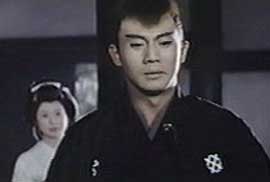 Chisa (Tamao Nakamura) entices Kyoshiro by pretending to need protection from Chen Sun, a dangerous Chinese fellow played by Tomisaburo Wakayama (credited by his transiently changed name, Kenzaburo Jo), best known in the west for his role as Ogami Itto in the Babycart series. Chen Sun is a leading proponent of Chinese boxing in Japan. Chisa (Tamao Nakamura) entices Kyoshiro by pretending to need protection from Chen Sun, a dangerous Chinese fellow played by Tomisaburo Wakayama (credited by his transiently changed name, Kenzaburo Jo), best known in the west for his role as Ogami Itto in the Babycart series. Chen Sun is a leading proponent of Chinese boxing in Japan.
He's not literally Chinese but is the thirteenth lineal descendant of the Chinese monk who introduced Kempo into Japan. He affects a Chinese costume & is proud of this lineage. He's not really the bad guy Chisa would make of him, but he is a powerful fighter unafraid to meet sword with open hand boxing.
Chisa was an agent for the wealthy & powerful Kaga clan against whom Chen has a grudge. When Chisa learns she's the bastard of the very Kaga lord (Sonosuke Sawamura) who would so easily sacrifice her, she blackmails him into submission.
The "Chinese Jade" is a Siamese buddhist statuette which contains a secret against the Kaga. When Kyoshiro figures out he's been sent to challenge Chen for no good reason, he decides out of sheer orneriness that he wants to find the Chinese jade for himself -- a plotline partially borrowed from a famous incident in the legendary life of Tange Sazen the one-armed swordsman.
He enjoys being a thorn in the side of the mighty. "I am just someone angry at mankind, even though I am myself a man," he quips, & coming close to a boast when he admits that he has often been "the ruin of evil men who cross my path."
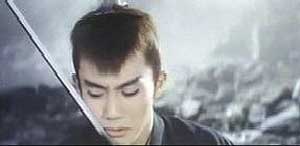 There's a curious moment by the river when Kyoshiro puts his face against the steel of his sword, as though it were his lover. And certainly his sexuality & his violence are closely linked. He humiliates & possibly rapes the Lord of Kaga's favorite concubine. There's a curious moment by the river when Kyoshiro puts his face against the steel of his sword, as though it were his lover. And certainly his sexuality & his violence are closely linked. He humiliates & possibly rapes the Lord of Kaga's favorite concubine.
It is typical of him to abuse women he perceives as too proud or villainous. This is certainly a flaw in his character because frequently the only "weapon" these women have is their sexuality.
Kyoshiuro uses his own sexuality to destroy women with the same heartlessness he expresses when killing a swordsman with his sword.
His attitudes against women whom he has judged harshly are in episode after episode contrasted to his attitudes toward women he perceives as downtrodden or in some manner noble of heart. In The Chinese Jade he is very kind to Chisa, for example, who like himself was an orphan.
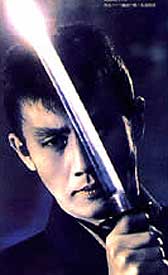 We are also in the course of the film introduced to Kyoshiro's signature "full moon sword technique, a thing of beauty that takes lives." We are also in the course of the film introduced to Kyoshiro's signature "full moon sword technique, a thing of beauty that takes lives."
There is not much practical about this technique if one analyses it from a martial arts point of view, but on the other hand, I could imagine it befuddling an opponent by its mysterious impracticality & decided beauty. Kyoshiro stands upright with sword drawn & pointing at the ground. He twists the blade so that the side rather than the edge faces his adversary, then he traces the full moon circle.
It's a mesmerizing motion. When a foe charges into that slowly circling blade, he finds the form simultaneously defensive & offensive, impenetrable & dealing instant death.
Shorinji style kempo boxing vs Full Moon swordplay provides the final duel, Chen vs. Kyoshiro, very nicely choreographed on a sandy hillside. The monk is defeated though uninjured, & vows they will have a rematch one day, "And I will snatch your sword away."
This pilot effort seems rather on the hoky side at times. Many of the most interesting things about Kyoshiro are not yet revealed in this film. It seems so-so for a commercial chambara adventure, & not the most promising start for a great series, unlike the Zatoichi series that was jaw-dropping awesome right from episode one.
But the Full Moon/Sleepy Eyes series gets better & better as the series progresses, & Kyoshiro increases his appeal as the archest of anti-heros, whose "samurai nihilism" very nearly satirizes the more severe nihilism seen in so many samurai movies.
A SECOND, OLDER REVIEW
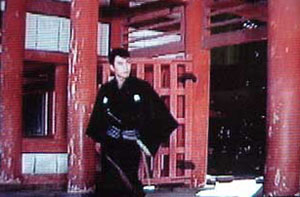 [I slightly hesitate to reprint this review, written for a late '70s chambara fanzine, as at the time I rather deplored Kyoshiro even while adoring Raizo. It was a feminist decade after all. I saw it at the Kokusai Theater in Seattle on a very large screen, a 35 mm subtitled print already faded with age.
I believe the review above is much more informative & well considered, whereas this review from my youth has a couple bits I can barely believe I said.
And yet the film really didn't go over big when it was first released & the series was nearly cancelled early on, until later episodes were made edgier & Nemuri became Raizo's signature role.
So possibly in seeing mostly the bad in this old review, I was seeing one aspect of the film accurately enough; but all these years later a nostalgia for the cinema of a given era has rendered me merely forgiving rather than with clearer critical eye.]
Enter Kyoshiro Nemuri, the Swordsman opens with immediate action, Nemuri surrounded by ninja of whom he asks, "Are you Iga men?" There is no reply, but instant slaughter.
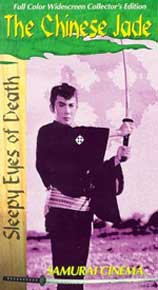 Director Tokuzo Tanaka takes the story downhill from here, delivering one of the least inspired films of what would be a long-running series. There are some elements of the plot that had potential, but none are developed sensibly. Raizo Ichikawa's acting is the least inspired of his career. Tomisaburo Wakayama's screen presence is in his role quite lacking, as his supposedly "Chinese" character is not credible. Director Tokuzo Tanaka takes the story downhill from here, delivering one of the least inspired films of what would be a long-running series. There are some elements of the plot that had potential, but none are developed sensibly. Raizo Ichikawa's acting is the least inspired of his career. Tomisaburo Wakayama's screen presence is in his role quite lacking, as his supposedly "Chinese" character is not credible.
Wakayama is playing a Shorin-ji boxer named Chen Sun, grandson of the founder of a Chinese style of boxing in Japan. The character predates his much more phenomenal character of Shinken in Wakayama's "karate killer priest" series, but there is no hint in Chen Sun's temple-boxing of the great temple-boxer Wakayama later created on the screen.
The story is convoluted & ridiculous; sorting it out can be interesting only as a mental exercise. It has to do with the bad guys' greed & lust for power, false revenge motives (the murdered man is alive & well & plotting nastily), a female ninja's true parentage, a secret scroll that can ruin the Kaga clan, illegal trade, & twenty or so other needless complicationis.
Cross connections between characters often make no sense. Some characters simply don't belong in the story, such as the appearance of Kunin "a degenerate monk" by his own admission, who raised Nemuri to age thirteen. He comes & goes to no purpose whatsoever.
Even Nemuri's presence in the story falls short of logical. People tell him things they have kept secret from everyone else, though he in no way seems like he'd be an easy confidante. He's allowed to walk into things, & out again, as though he were the most trustworthy man of all time. He observes everything with a cynical, judgemental, perhaps objective eye & none of the zillion bad-guys seem to mind.
Striving for poignant effect, a scene by a waterfall has Nemuri placing his cheek to his sword blade as though it were his lover. In Destiny's Son (Kiru, 1962), Raizo managed to convince the audience that his sword was something he was overawed by & in love with, but in Enter Kyoshiro Nemuri the scene evokes mainly a grin.
The kunoichi (female ninja) Chisa (Tamao Nakamura) spices up the plot not one whit. She seems to have had little or no actual ninja training & degenerates into love-interest rather more quickly than most such characters. Curiously, however, Nemuri the woman-hater falls in love with her, contradicting what would generally be his nature in many future episodes (although he does also experiences love in The Full Moon Swordsman: Trail of Traps, 1967).
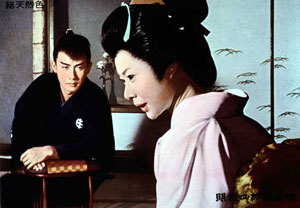 Chisa dies rather pointlessly, as did her mother, a nun, & the final scene has Nemuri lamenting the loss of the only beautiful thing he ever had. It's staged so badly, it's even harder to swallow than the waterfall scene where is sword is his most beautiful thing. Chisa dies rather pointlessly, as did her mother, a nun, & the final scene has Nemuri lamenting the loss of the only beautiful thing he ever had. It's staged so badly, it's even harder to swallow than the waterfall scene where is sword is his most beautiful thing.
I found myself merely waiting for the end of the film so that I could see the chief antagonist meet Kyoshiro in a climactic duel. Tomisaburo Wakayama as the Chinese Shorin-ji boxer versus Ichikawa's Full Moon sword style, I was hoping against hope, would be worth the wait.
When that final encounter inevitably arrives, Chen Sun does manage to grab Nemuri's blade despite his mystic engetsu full moon style. But Chen Sun cannot wrest the sword from Nemuri's hands & as if we ever doubted the outcome, the Chinese boxer loses. Unfortunately, empty hand versus weapons doesn't make a victorious swordsman look all that phenomenal. Bringing just your fists to a swordfight is like bringing just your knife to a gunfight.
Which is perhaps why Kyoshiro doesn't slay him, but lets the boxer walk off into the sunset. There's an implication that he'll reappear in a later episode of the series (he'll turn up in Full Moon Swordsman: Sword of Passion, 1964).
The theme for his pilot episode was a difficult one to pull off in the first place. It never seemed likely an empty-hand fighter could defeat a super-swordsman. It would have been an effective encounter only if, along the way, we'd been given reasons to truly believe Chen Sun could equal Kyoshiro Nemuri. We never believe it as even a distant possibility. So we get an usuccessful closing duel in a largely silly film. Fortunately, Kyoshiro Nemuri would have several more feature film episodes giving Raizo Ichikawa an opportunity to salvage this character's image.
copyright © by Paghat the Ratgirl
|
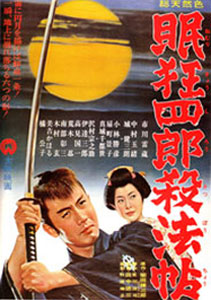

 Though we as film goers may admire Raizo's performance in this unusual & morally ambiguous role, our initial opinion is apt to be wrong, that this character is ninety-percent heroic & when he "cuts up men like radishes" they deserve it.
Though we as film goers may admire Raizo's performance in this unusual & morally ambiguous role, our initial opinion is apt to be wrong, that this character is ninety-percent heroic & when he "cuts up men like radishes" they deserve it.
 There's a curious moment by the river when Kyoshiro puts his face against the steel of his sword, as though it were his lover. And certainly his sexuality & his violence are closely linked. He humiliates & possibly rapes the Lord of Kaga's favorite concubine.
There's a curious moment by the river when Kyoshiro puts his face against the steel of his sword, as though it were his lover. And certainly his sexuality & his violence are closely linked. He humiliates & possibly rapes the Lord of Kaga's favorite concubine. We are also in the course of the film introduced to Kyoshiro's signature "full moon sword technique, a thing of beauty that takes lives."
We are also in the course of the film introduced to Kyoshiro's signature "full moon sword technique, a thing of beauty that takes lives."
 Director Tokuzo Tanaka takes the story downhill from here, delivering one of the least inspired films of what would be a long-running series. There are some elements of the plot that had potential, but none are developed sensibly. Raizo Ichikawa's acting is the least inspired of his career. Tomisaburo Wakayama's screen presence is in his role quite lacking, as his supposedly "Chinese" character is not credible.
Director Tokuzo Tanaka takes the story downhill from here, delivering one of the least inspired films of what would be a long-running series. There are some elements of the plot that had potential, but none are developed sensibly. Raizo Ichikawa's acting is the least inspired of his career. Tomisaburo Wakayama's screen presence is in his role quite lacking, as his supposedly "Chinese" character is not credible. Chisa dies rather pointlessly, as did her mother, a nun, & the final scene has Nemuri lamenting the loss of the only beautiful thing he ever had. It's staged so badly, it's even harder to swallow than the waterfall scene where is sword is his most beautiful thing.
Chisa dies rather pointlessly, as did her mother, a nun, & the final scene has Nemuri lamenting the loss of the only beautiful thing he ever had. It's staged so badly, it's even harder to swallow than the waterfall scene where is sword is his most beautiful thing.